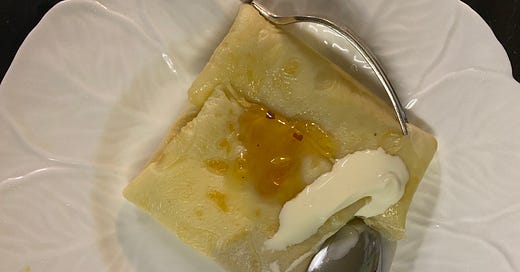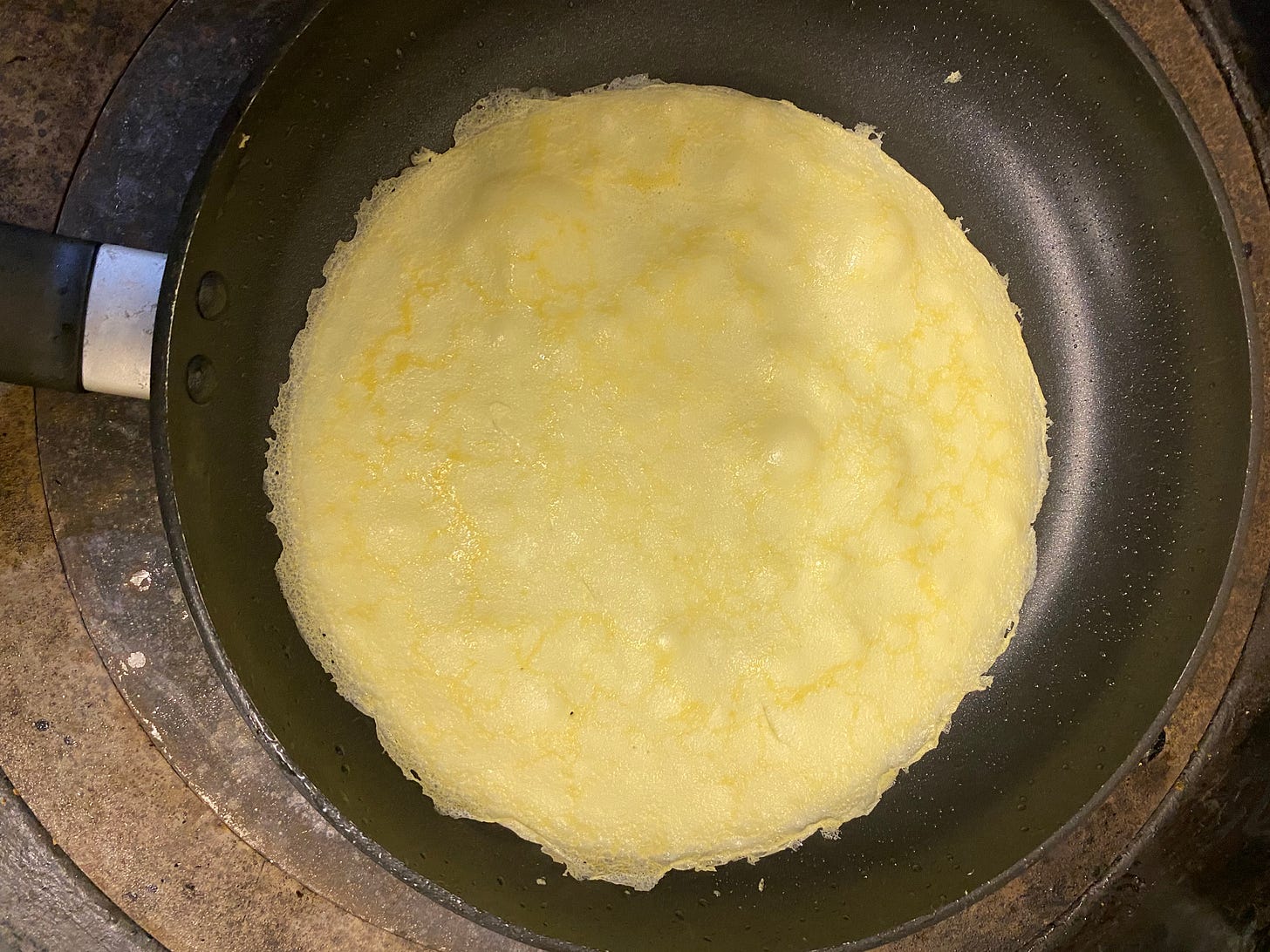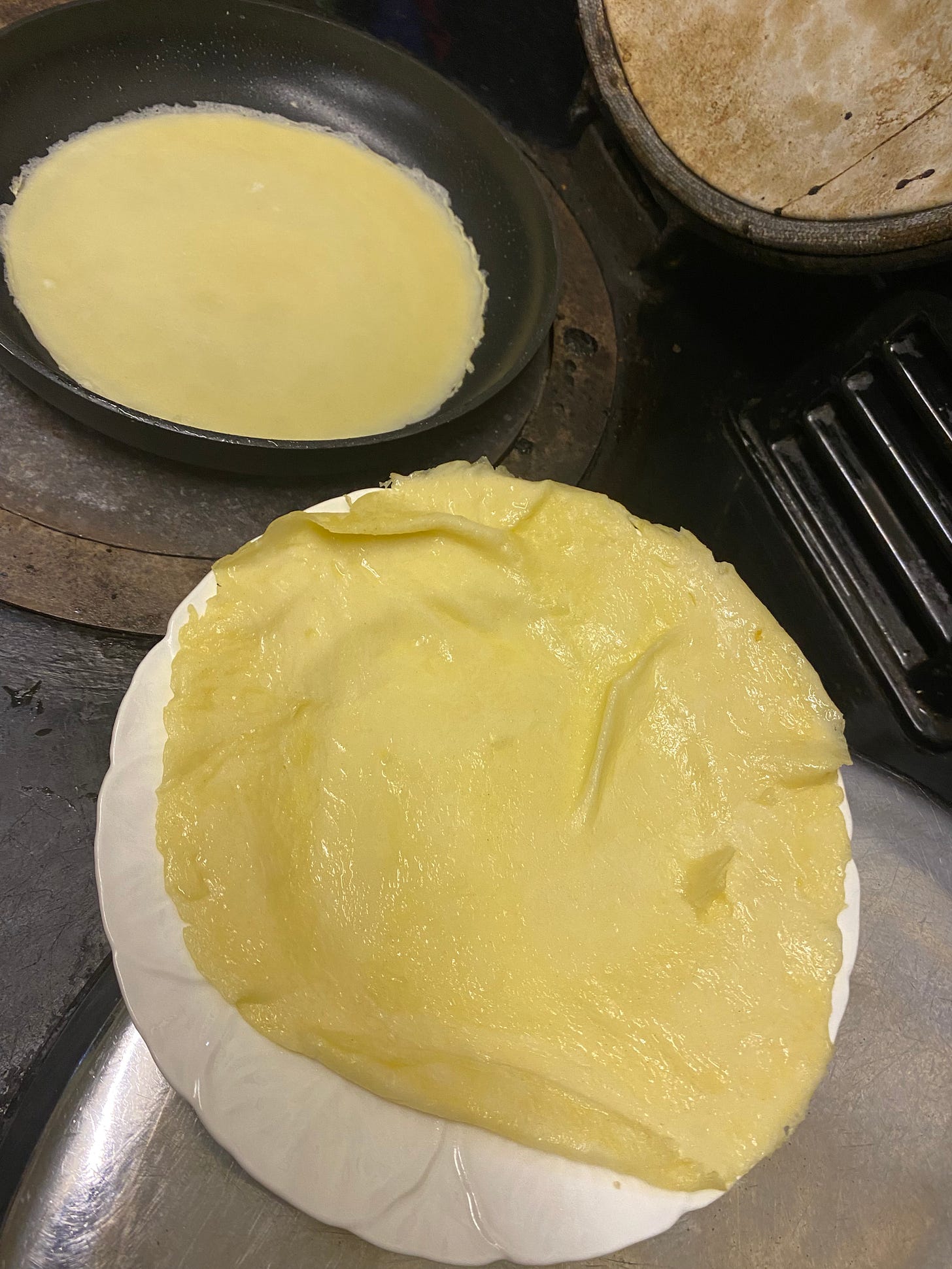Easter is the first Sunday after the first full moon following the vernal equinox. It’s a moveable feast in common with Shrovetide. Shrove Tuesday falls forty seven days prior to Easter. The date of this festival of gaiety before the abstinence of Lent varies from 3rd February and March 9th.
Following the new moon of February: Quinquagesima Sunday or Shrove Sunday is followed by Shrove or Collop Monday and then Shrove Tuesday commonly known as Pancake Day. These three days collectively known as Shrovetide, are when Christians prepare for Lent which begins on Ash Wednesday (the day after Shrove Tuesday). The word Shrove comes from the word to shrive which means to gain absolution by penance and confession of sin.
At one time during Lent Christians abstained from meat, eggs and dairy. In the Middle Ages fish was elevated to the rank of a penitential food at this time of abstinence.The making of pancakes provided a useful method of clearing the larder, of using up eggs and dairy products. Milk, eggs, butter and flour are the ingredients that are used in pancakes. There was cake too. Christina Hole in A Dictionary of British Folk Customs mentions that in Baldock, Hertfordshire, doughnuts fried in hog’s lard were eaten on Shrove Tuesday, and that in Norwich, small currant buns shaped like shells (coquilles) were sold by street vendors and on sale in bakeries.
The practice of cutting meat into strips (known as collops) before its preservation (by salting and hanging up to dry) led to the naming of Collop Monday. Latterly, Collop Monday become associated with eating ham or bacon; it was the last day that flesh and fowl were eaten prior to Lent. In the days before Ash Wednesday there were Shrovetide feasts and contests before the annual austerities of Lent. Austerity meant eating less food, having less fun and of course spending more time in prayer. In the time of Chaucer, Shrovetide was a time for popular festivities and jollity. Activities included cockfighting and other rather brutal pastimes. There were carnivals and processions with a permitted element of misrule. The word carnival is said to come from the Latin, carnevale, to remove meat - goodbye to meat or flesh.
Heath in his Account of the Scilly Islands (p120) writes:
‘On a Shrove Tuesday after the throwing at cocks is over the boys in this island have a custom of throwing stones in the evening against the doors of the dwellers’ houses – a privilege they claim from time immemorial and put in practice without control for finishing the day’s sport.’
The throwing of stones and broken crockery (Lent Crocking) is a well documented Shrovetide activity. Traditionally, Shrove Tuesday was an Apprentice holiday. A rather chaotic football game called Shrovetide football was enjoyed and this event still takes place today, in Ashbourne, Derbyshire. Two teams of players compete to move a ball to opposite ends of Ashbourne. The severity of fasting and penances were harsh, so it is understandable that those in Merrie England (and beyond) sought a Shrovetide of merriment.
Shroving or Lent-Crocking was a children’s custom which involved bands of Shrivers going door to door requesting ingredients to make pancakes (or indeed anything else that was to hand). Christine Hole notes geographical variation of Shroving songs but the sentiment is similar.
A- shroving a- shroving,
We be come a-shroving;
A piece of bread, a piece of cheese,
A bit of your fat bacon,
Doughnuts and Pancakes. All of your own making;
Snick, snack, the pan’s hot,
We’re come a -shroving.
Strike while the iron’s hoxt,
Something’s better than nothing.
Flour’s cheap and land’s dear
And that’s why we come shroving here.
Interestingly, Shrovetide is in the Church’s calendar at a time of slenderness in the agricultural year, when nature’s larder is bare. A time of frugality. This may have influenced the traditional ‘begging’ or shroving of the ingredients needed to make pancakes.
The Shriving bell was rung in churches on Shrove Tuesday. This encouraged parishioners to come to confession (shriving) but it also signalled the start of a holiday for apprentices and schoolchildren. The Pancake bell was awaited eagerly. It is still rung by some churches as a reminder to pop pancakes on the stove and for the Christian, it’s a call of the faithful to confession. Alas, the Shrove holiday has long gone.
Westminster School celebrates Shrove Tuesday with an annual custom known as the Westminster Greaze. This involves a large pancake being tossed over an iron bar that is sixteen feet high. The pancake is then retrieved by the pupils. The schoolchild with the largest piece of pancake is rewarded. In days gone by this involved the whole school. However, the scrum is less of a scramble nowadays with each academic year having a chosen representative. The prize at one time was a guinea coin. In 1919, King George V, Queen Mary, the Prince of Wales and Duke of York were present to see the pancake tossed and boys rush to gather the largest piece.
Pancake tossing races still feature today. In Olney, Buckinghamshire, Christine Hole records that the pancake bell announces the pancake race, a race that has been run since 1450. Apron clad housewives race to the church tossing their pancakes as they go. This continues to be a female only race according to Ruth Martin, a 2023 member of the Olney Pancake Race Committee. Martin states that to compete in the pancake race you have to have lived or worked in Olney for at least three months," "You have to wear a skirt, and you are provided with an apron and headscarf and a pancake pan, but you need to bring your own pancake’ There is without doubt an art in tossing a pancake deftly. Another legend suggests that a lady heard the Pancake bell tolling (known as the Pankeeak bell) and ran with frying pan (and pancake) in hand, to avoid being late for church.
Recipes vary from country to country. The French eat a thin Crepe Suzette. In the USA, pancakes are thick and fluffy whilst in Ireland, a Boxty pancake is made using buttermilk. At one time in Scotland, crowdie was offered on Shrove Tuesday. New Orleans celebrates Mardi Gras (Fat Tuesday) in extravagant style with processions and celebratory balls.
The time to think about Lent is perhaps not Ash Wednesday, but the three Sundays before Lent: Septuagesima Sexagesima and Quinquagesima. A time to countdown until Easter. The Pancake bell could be preceded by bells on these three Sundays. A dong to help us adjust during the season of pre-Lent and the race towards the resurrection (Easter).
Shrovetide is a time of celebration and pancake eating, but it begs the question: What is Shrovetide without Lent?







I love reading your historical details, it’s so interesting. When I taught we always had a pancake race around the school field, the children loved it, and eating the pancakes!